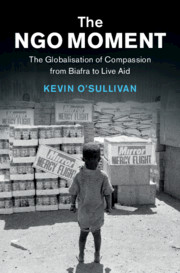Book contents
- The NGO Moment
- Human Rights in History
- The NGO Moment
- Copyright page
- Contents
- Acknowledgements
- Abbreviations
- Introduction
- Part I The Ends of Empire
- 1 Encountering the Third World
- 2 Putting Down Roots
- Part II An NGO Movement
- Part III Conduits of World Culture
- Part IV A People’s Compassion
- Notes
- Bibliography
- Index
1 - Encountering the Third World
Biafra, 1967–1970
from Part I - The Ends of Empire
Published online by Cambridge University Press: 01 October 2021
- The NGO Moment
- Human Rights in History
- The NGO Moment
- Copyright page
- Contents
- Acknowledgements
- Abbreviations
- Introduction
- Part I The Ends of Empire
- 1 Encountering the Third World
- 2 Putting Down Roots
- Part II An NGO Movement
- Part III Conduits of World Culture
- Part IV A People’s Compassion
- Notes
- Bibliography
- Index
Summary
This chapter traces the origins of the NGO moment to the humanitarian crisis precipitated by the Nigeria-Biafra War. It describes humanitarianism as a key component of the West’s response to decolonisation, linking imperial notions of charity, relief and development to the practices adopted by NGOs. The principle of ‘access’ is at the heart of this chapter. ‘Access’ was central to the public narrative of intervention in Biafra: through the NGO-inspired model of ‘people-to-people’ action that drew so much popular support for the region, and in the televised images of the aid airlift that brought supplies into the region. It was important in a practical sense, too: in the continuities of personnel (missionaries and former colonial officials) from empire that were vital in the operation of non-governmental aid. And, this chapter argues, it also offered a reminder of the importance of Third World governments in shaping the territory of emergency relief. In Biafra, the relationship that NGOs cultivated with the local regime lay at the heart of their claims to legitimacy in the West, while also granting considerable agency to local authorities in setting the agenda of non-governmental aid.
Keywords
- Type
- Chapter
- Information
- The NGO MomentThe Globalisation of Compassion from Biafra to Live Aid, pp. 17 - 33Publisher: Cambridge University PressPrint publication year: 2021

